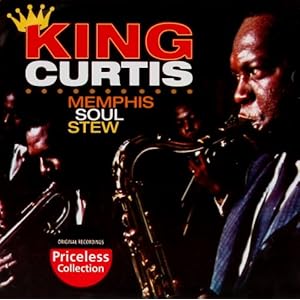Some songs create a picture in your mind, they create a level of curiosity in how they were created and who played on them. Reading The Memphis Boys has opened my eyes to how many great R&B songs the guys at American Sound studios played on, Memphis Stew included. I'd always assumed that the song had been recorded in New York by session players up there as King Curtis was a mainstay of the New York music scene and had been for a decade or more before this record came out.
King Curtis was from Fort Worth Texas and had originally cut his musical teeth with Lionel Hamptons big band before moving to New York to work as a session musician. His most notable work was with the Coasters where his honking chicken sound was heavily featured, Curtis however still maintained an interest in jazz working with the likes of Nat Adderley. He also contributed some fine R&B sax to some of Ronnie Hawkins' best work on Roulette from the late 50's into the early 60's. In 1962 he hit the charts with Soul Twist and continued to record and release albums on a regular basis.
In 1967 he ventured south to Memphis for some recording sessions instigated by Atlantic Records' Jerry Wexler who had already scored some success with Aretha Franklin and Wilson Pickett. The musicians at American studios were garnering a reputation for exact musicianship and a passion for R&B that surprised many as all the players were white. I can't rave enough about the bass playing of Tommy Cogbill who has never received the due credit he deserves, such a propulsive sound that never wavered but a style that also resonated with subtlety. He kicks the song off with a nice funky riff that repeats as King Curtis introduces his listener to tempting taste of a downhome memphis soul stew, Curtis then declares that he will add a tea cup of bass once again prompting a funky repeated riff that sets the tone for the track. King Curtis then summons up a pound of fatback drums releasing drummer Gene Chrisman to build a syncopated jagged beat. Chrisman had been criticised in sum quarters as not being an R&B drummer but he shows on this track that he is more than capable of laying down a funky backbeat. Then it's guitarist Reggie Youngs turn to add some bawling memphis guitar to the encouragement of Curtis who exclaims that "this gonna taste alright". Young was the master of understatement every lick was different, he was capable of equal amounts of subtlety and piercing intensity. Young provides the overlapping lick and then steps back into the background as King Curtis starts to build the rhythm adding some organ before letting himself and the Memphis Horns step up the attack. Curtis is at his most fierce firing off raw bursts as pushes the band to match him step for step.
Memphis Soul Stew was a commercial success on its release reaching #6 on the R&B chart and crossing over to #33 on the pop chart and was also the beginning of a defining creative partnership with the Memphis musicians over the next two years. King cut a great live version with his band the King Pins which featured some outstanding musicians, Jerry Jemmott on bass who also played with Aretha Franklin during the same period. On guitar was Cornell Dupree who was later a mainstay of Roberta Flacks' band and Bernard Purdee on the drums.

No comments:
Post a Comment